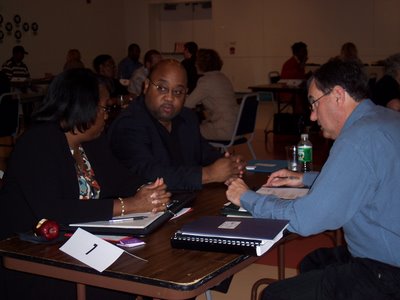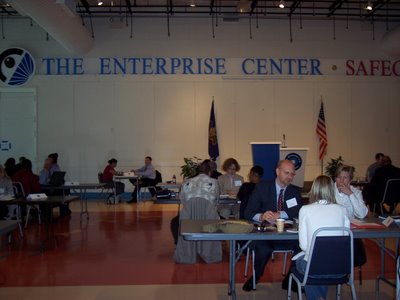Several years ago, Connie Betson* and her two children moved into a modest, two-bedroom rowhouse in Northeast Philadelphia. Connie had signed a lease/purchase agreement with a friend who owned the property. She had saved her money diligently to make the downpayment and had borrowed money from friends, working hard to make the monthly installments. Once she had made the last payment, her friend told her that she was now the rightful owner of the property. A few months later, a letter arrived telling Connie that her friend, the “owner” of the house, had not paid real estate taxes in many years and that foreclosure was imminent if the delinquent taxes were not paid. Connie attempted to arrange a payment plan to pay the delinquent taxes but was told that her friend was still the record owner of the property and that she could not arrange a payment plan because she was not the legal owner. When she tried to find her friend to clear up the title issue, Connie found that her friend had moved and left no contact information. Connie and her children were left with a house that they had paid for but that they would soon lose to a tax foreclosure, leaving them homeless and without the savings that they had spent to purchase their home.
Connie and her children are not alone in this dilemma they face. Every day, Philadelphia VIP/LawWorks speaks with low-income Philadelphians who find themselves in similar situations where they have a legal right to own their homes but are not the record owners of their homes. Aside from lease/purchase situations like Connie Betson’s, homeownership issues may arise when the record owner of a property is a deceased relative whose estate was never probated. Individuals who are living in homes with such tangled titles face significant consequences if title to their home is not transferred into their name. They may not be able to apply for repair grants to fix leaking roofs and replace missing windows. They also may be unable to take out a home equity loan to deal with an unexpected home repair or to arrange a payment plan to pay delinquent utilities or real estate taxes to delay a foreclosure. Without legal title most of these individuals will be unable to stay in their homes – due to a Sheriff’s sale or to living conditions that have become unlivable – leaving their families without a home and without the only asset that could save them from sinking more deeply into poverty. This dire situation is exactly where Connie Betson found herself when she discovered that she could not save her home from foreclosure without legal title.
Yet these issues do not affect only the Connie Betsons of Philadelphia. They also have a significant impact on the city’s neighborhoods and the broader Philadelphia community. Title problems result in an increase in homelessness, adding to the approximately 2,500 people that already sleep in shelters in Philadelphia every night. The homes that these individuals have abandoned also affect the entire surrounding neighborhood. Vacant homes often become the site of criminal activity and are physically dangerous and prone to fire and accidents, potentially leading to the City demolishing it as a nuisance. Vacant homes also decrease the value of other homes on a block by an average of $7,000, and homeowners who live within 50 feet of a vacant property become ineligible for homeowners’ insurance due to the risks associated with vacant homes.
While the negative impact that unresolved title problems can have on low-income Philadelphians and the broader community may appear overwhelming, a number of Philadelphia’s legal services organizations banned together several years ago to address the issue by creating LawWorks, a small but vibrant community development project managed by Philadelphia VIP. LawWorks has taken many steps to address the needs of low-income Philadelphians who have homeownership issues. We regularly refer clients to private-sector attorneys who provide legal assistance on a pro bono basis, and we provide ongoing training and support to these attorneys. We also foster relationships with private-sector volunteer attorneys and their firms, including the development of pro bono practice groups devoted solely to addressing the needs of these residents. Additionally, we participate in educational outreach programs that educate low-income Philadelphians on identifying and preventing homeownership problems.
With funding from the City’s Office of Housing and Community Development (OHCD) and several corporate and foundation donors, Philadelphia VIP/LawWorks also provides direct legal representation and financial assistance to clients. Of particular significance is the Tangled Title Fund that Philadelphia VIP/LawWorks has established, through funding from OHCD. The Fund assists those with homeownership issues by paying for costs such as probate filing fees, court-ordered notice by publication of probate and quiet title matters, inheritance taxes, title insurance, and transfer taxes. The average cost for these unavoidable expenses is $1,100, a sum that would be prohibitive for most LawWorks applicants without the help of the Fund, unless they were to forego necessities like food, heat, and power. As a result, the legal representation and financial assistance that LawWorks provides is critical to keeping low-income Philadelphians in their homes.
Connie Benson’s case provides an excellent example of the assistance that Philadelphia VIP/LawWorks and its volunteer attorneys can provide to low-income Philadelphians struggling to stay in their homes. A volunteer attorney representing Connie would file a “quiet title” action against Connie’s friend, alleging that she had failed to transfer title of the property once Connie had made all of her payments under the agreement. More likely than not, Connie’s friend would never come forward to defend herself, and the volunteer attorney could then ask the court to order that title to the property be transferred into Connie’s name. The attorney would also be able to seek financial assistance from the Tangled Title Fund, so that Connie could pay the transfer taxes owed when her deed is finally recorded. Connie would then become the legal owner of the property, allowing her to arrange a payment plan for her delinquent taxes, to take out a home equity loan, and to do everything else that legal title entitles her to do as a homeowner.
Through this type of financial and legal assistance, Philadelphia VIP/LawWorks strives to meet the many needs of clients who have homeownership problems. With continued and growing support from the private sector of the Philadelphia legal community, the Philadelphia courts, and local and state government agencies, LawWorks has reached a pivotal point where more and more Philadelphians are turning to us for help. Philadelphia VIP/LawWorks hopes that others will join this collaboration to ensure that low-income Philadelphians who find themselves in Connie Betson’s situation have the resources to fight to shelter their families in safe, habitable housing.
*For confidentiality reasons, the story of Connie Betson is a compilation of actual client stories representative of the issues that Philadelphia VIP/LawWorks’ homeownership clients face.
© 2006 The Philadelphia Lawyer. Used with permission.
Article written by Kelly Gastley, Independence Fellow at Philadelphia VIP.
For a .pdf version you may click here





